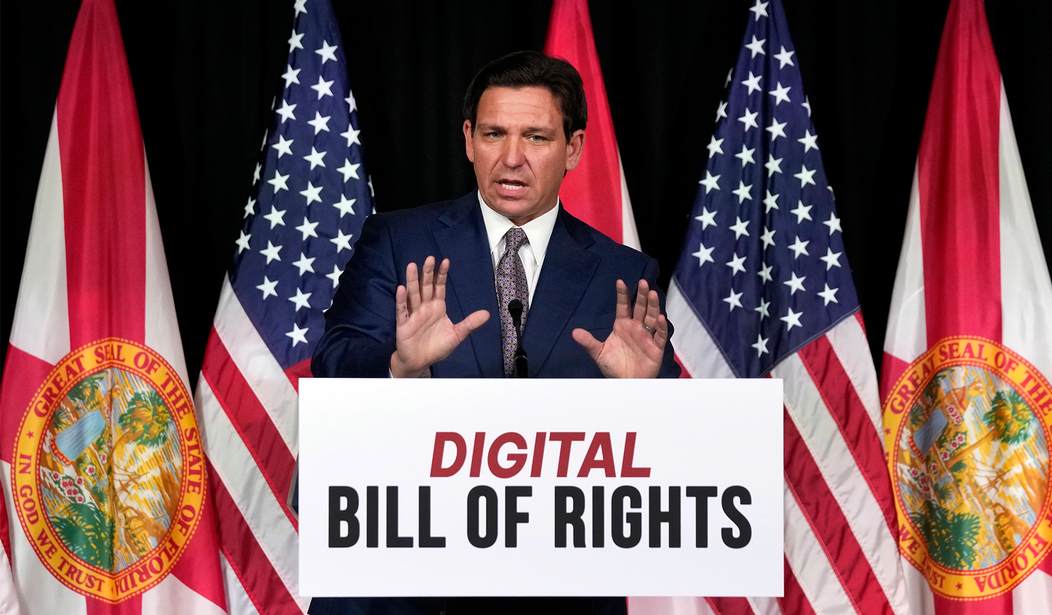Florida Gov. Ron DeSantis has presided over a whirlwind of activity this legislative session, signing bills that protect Floridians from environmental, social, and governance (ESG) scores; expand school choice; and curtail critical race theory and diversity, equity, and inclusion initiatives in Florida’s classrooms.
This week, DeSantis followed up on those successes by signing legislation that creates a Digital Bill of Rights to shield Floridians from undue censorship at the hands of Big Tech.
In short, the new law grants Floridians:
- The right to control personal data, including the right to confirm, access, and delete your personal data from a social platform;
- The right to know that your personal data will not be used against you when purchasing a home, obtaining health insurance, or being hired;
- The right to know how internet search engines manipulate search results;
- The right to opt out of having personal data sold; and
- The right to protect children from personal data collection.
Furthermore, the new law “prevents government-led censorship by prohibiting state or local government employees from colluding with Big Tech companies to censor protected speech” and “adds biometric data and geolocation information to the definition of personal information under the Florida Information Protection Act.”
According to DeSantis:
Floridians should have the right to control their own personal data. If a multibillion-dollar company is conspiring to take your data and sell it or use it against you, it is your right to be able to protect that data. No longer will the Big Tech oligarchs be able to commandeer your personal information and deprive you of the right to access, confirm, or delete that data as you wish.
Over the past few years, Big Tech censorship has become an enormous problem that has poisoned the public policy debate across multiple matters, affected elections, led to the cancelation of an untold number of Americans, swayed the societal discourse in the direction Big Tech favors, and restricted Americans’ access to information, among many more malevolent endeavors.
At the federal level, any attempts to stifle Big Tech censorship have met firm resistance, probably due to the fact that Big Tech has plenty of money to hire highly skilled lobbyists and create special interest groups with the overriding goal of maintaining the status quo. We also should not discount the role that Section 230 of the 1996 Communications Decency Act has played in shielding Big Tech from warranted regulation and scrutiny.
Fortunately, the United States is a federal republic, which means that states have sovereignty. As the Tenth Amendment states, “All powers not delegated to the United States by the Constitution, nor prohibited by it to the States, are reserved to the States respectively, or to the people.”
Because the United States embraces federalism, and the states are the laboratories of democracy, we have a rich history of states bucking the federal trend. This is generally a good thing because it breeds innovation, and acts as a proving ground of sorts for laws at the state level. It also allows states to tinker with laws and perfect them, before they are rolled out on a national level.
This legislative session, Florida has acted as a laboratory of democracy pertaining to several contentious issues. Over time, we shall see if the legislative solutions Florida has enacted to these vexing problems prove to be successful. If that is the case, which I assume it to be, we will likely see more states follow the Florida model.
Eventually, if past is prologue, some of these legislative solutions will ultimately be embraced at the federal level. When it comes to Big Tech censorship (along with many other deep-rooted problems), I hope Florida’s Digital Bill of Rights proves to be the antidote to this highly concerning problem. And, if that ends up being the case, we could see a national Digital Bill of Rights in the not-so-distant future.
Chris Talgo ([email protected]) is editorial director at The Heartland Institute.













Join the conversation as a VIP Member